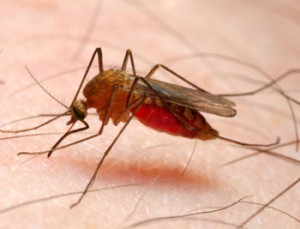What is malaria?
Malaria is a serious infection caused by a protozoan parasite called plasmodium which spreads through bite of female anopheles mosquito. There are four different types of plasmodium species which infects humans namely P. Vivax, P.Falciparum, P.Ovale and P.Malariae. P Vivax is the most common type and P. Falciparum being the most severest type.
Fig:Female Anopheles mosquito
How common is malaria in children
Malaria is very common in developing countries like India. According to World Health organization children under five years of age are one of most vulnerable groups affected by malaria. There were an estimated 660 000 malaria deaths around the world in 2010, of which approximately 86% were in children under five years of age.
How does malaria present?
Malaria usually presents with fever accompanied by headache, vomiting, aches and pain in muscles. If left untreated the child can be severely ill leading to death. Children with severe malaria may present with difficulty in breathing, altered sensorium/coma, seizures, poor urine output and jaundice.
A blood test may show malarial parasite in the blood, Low blood sugar, deranged kidney functions, Anemia, and excessive acid content in the blood(acidosis). It is important to remember other conditions which presents with similar symptoms.
How is malaria diagnosed
In children suspected to have malaria examination of thick and thin blood films under a light microscope helps in diagnosing malaria and identifying the type of malarial parasite infecting the child. Rapid diagnostic tests like immunochromotographic tests, Polymerase chain reactions, etc are available now.
What is the treatment for malaria
Treatment depends on the clinical condition of the child. It is important to confirm the diagnosis before commencing treatment but if the child is very sick presumptive treatment is indicated, as investigations may take longer to get back.
The common medications used to treat malaria are chloroquine, Primaquine, Artesunate, Sulfadoxine+Pyrimethamine and please consult with your doctor. In case of severe malaria Intravenous quinine, artesunate, artemether etc., may be needed. In addition to medications supportive care like maintaining blood pressure, circulation and nutrition is very important.
How can we protect against malarial infection
As the malarial parasite is transmitted via female anopheles mosquito the disease can be controlled by eradication of mosquitos. This may not be possible always and other measures involve protection against mosquito bites(mosquito nets, Repellant creams etc), antimalarial prophylaxis if you are planning to travel to an area endemic for malaria.
Author: Dr.S.Boopathi
![]()

